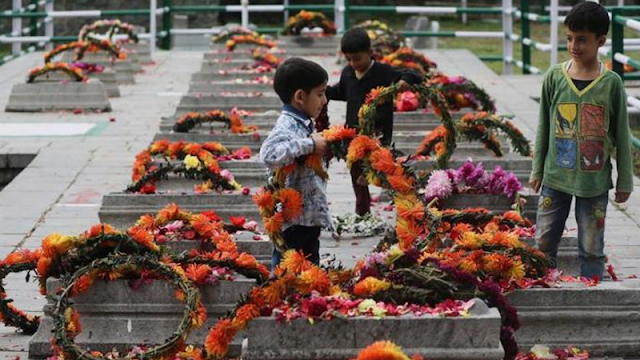Every year on July 13, the region of Kashmir solemnly observes Martyrs' Day—a day etched into the collective memory of its people. It marks the tragic yet heroic events of 13 July 1931, when 22 Kashmiri men laid down their lives in the struggle against autocratic rule and for the rights of the people.
More than just a date, Kashmir Martyrs' Day symbolizes a historic awakening and a deep yearning for freedom, justice, and dignity.
Historical Background – What Happened on 13 July 1931?
Under the rule of the Dogra dynasty, the Muslim-majority population of Kashmir experienced widespread discrimination, suppression, and denial of basic rights. Tensions came to a head in July 1931, when people gathered at Central Jail, Srinagar, to witness the trial of a young man named Abdul Qadeer, who had spoken against the oppressive regime.
As the Azan (call to prayer) was being called out by one man in the crowd, a policeman shot him dead. One after another, 21 more stepped forward to complete the prayer—and were shot dead, one by one.
Their sacrifice shook the conscience of the valley and became a turning point in the political awakening of the people of Kashmir.

Why Is Martyrs' Day in Kashmir Important?
-
Symbol of resistance: It marks the beginning of organized opposition to tyranny and oppression.
-
Cultural significance: These martyrs are seen as pioneers of political consciousness in Kashmir.
-
Legacy of courage: It serves as a reminder of the importance of standing up for truth, even at great personal cost.
For decades, Martyrs’ Graveyard in Srinagar's Naqshband Sahib area has been the site of remembrance, where people pay floral tributes and recall the bravery of these 22 individuals.

Observance of Martyrs’ Day
Traditionally, the day was marked by:
-
Wreath-laying ceremonies at the Martyrs’ Graveyard
-
Political speeches reflecting on history and the path forward
-
Community prayers for peace and justice
In recent years, however, official observance of the day has seen changes, particularly after the revocation of Article 370 in 2019. Yet for many Kashmiris, the day remains an emotional and symbolic reminder of their historical struggle.
Lessons from the Martyrs of Kashmir
The sacrifice of July 13 martyrs teaches us that:
-
Voices of justice cannot be silenced by force
-
Unity in purpose can inspire lasting change
-
Peaceful resistance holds immense power in confronting injustice
These martyrs were not armed soldiers or political elites. They were ordinary people with extraordinary courage, choosing to face bullets rather than surrender their dignity.

Conclusion
Martyrs' Day in Kashmir is not merely a day of mourning—it is a day of remembrance, reflection, and renewal of commitment to justice and peace. As we honor the memory of those who fell on 13 July 1931, we are reminded that the pursuit of truth and dignity is a timeless journey—one that lives on in the hearts of every generation.



.jpeg)